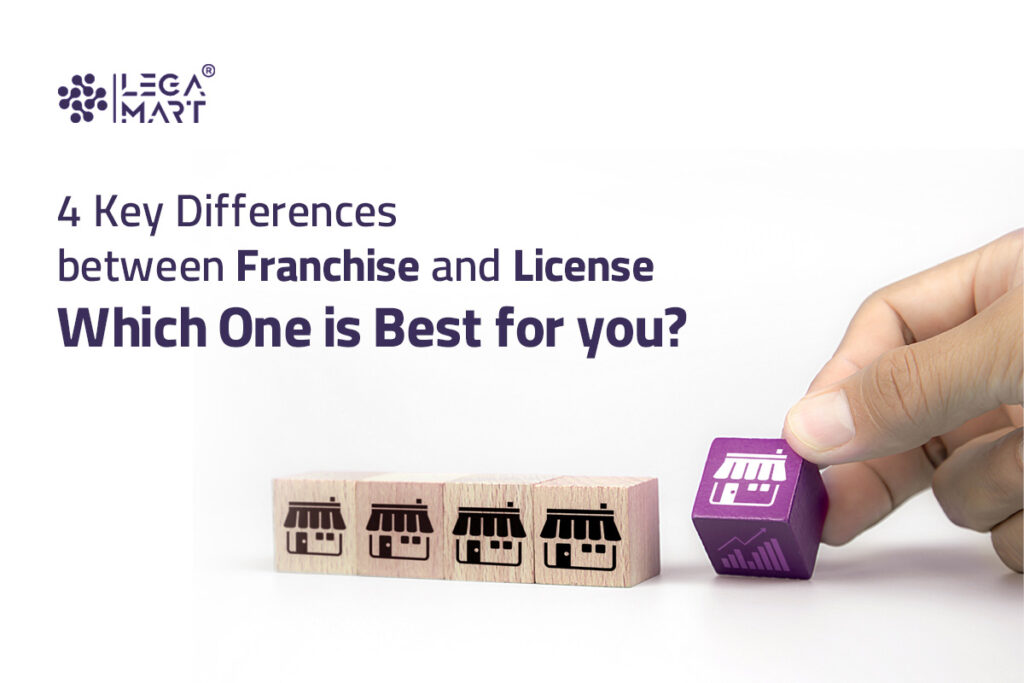Introduction
Franchises and licenses represent distinct business agreements involving the sharing of brand elements in return for fees. While both arrangements involve a fee-for-use model, a franchising agreement encompasses an entire business brand, including its operations. In contrast, a licensing agreement is more limited, focusing solely on using registered trademarks. Despite some surface-level similarities, it’s crucial to recognize that franchising and licensing are fundamentally different agreements, each carrying unique implications for both the business owner and the brand itself.
The main difference between a franchise agreement and a license agreement is that a franchisee can use the franchisor’s trademark and comply with brand standards. Still, by entering into a license agreement, the licensee only has the right to use the licensor’s trademark and won’t learn about its standards and know-how.
Since these terms may seem similar, to avoid confusion, we have defined franchise agreements and then turned them into their differences.
What Is a License?
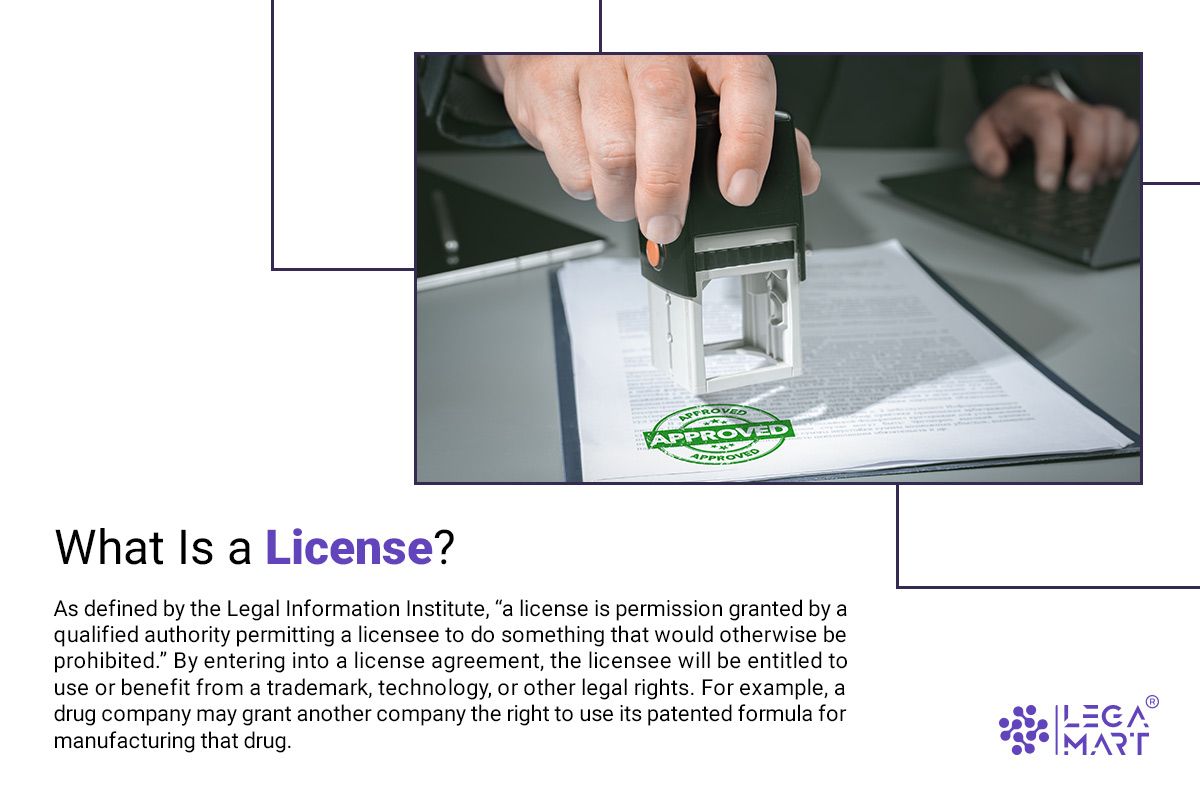
As defined by the Legal Information Institute, “a license is permission granted by a qualified authority permitting a licensee to do something that would otherwise be prohibited.” By entering into a license agreement, the licensee will be entitled to use or benefit from a trademark, technology, or other legal rights. For example, a drug company may grant another company the right to use its patented formula for manufacturing that drug.
The license agreement will restrict what the licensee can and cannot do with the licensed asset. Still, as opposed to the franchise agreement, it does not allow the licensor to control the overall operations of the licensee’s business.
A famous example of licensing agreement was the one between Nestle and Starbucks; In May 2018, Nestle (the licensee) agreed to pay $7.15 billion in cash to Starbucks (the licensor) for exclusive rights to sell Starbucks’ products (single-serve coffee, teas, bagged beans, etc.).
Pros and Cons of Licensing
Licensing as a business strategy comes with distinct advantages and disadvantages including:
Pros
- Freedom: Licensing allows the licensee to use established and recognized protected marks, leveraging an existing fan base and ensuring a secure investment for business enhancement.
- Simplicity of Agreement: Licensing agreements are relatively simple and straightforward, focusing on using specific protected marks without the complexity of broader business operations.
Cons
- Limitations: The primary limitation of licensing is that it grants access only to specific protected marks, restricting the scope of the agreement. However, this simplicity may suffice for businesses with targeted needs.
- Understanding and Legal Boundaries: There is often confusion regarding the purpose of licensing agreements and potential legal boundaries with franchising. Seeking legal advice is crucial to ensure compliance and avoid unintentional franchising implications.
What Is a Franchise?
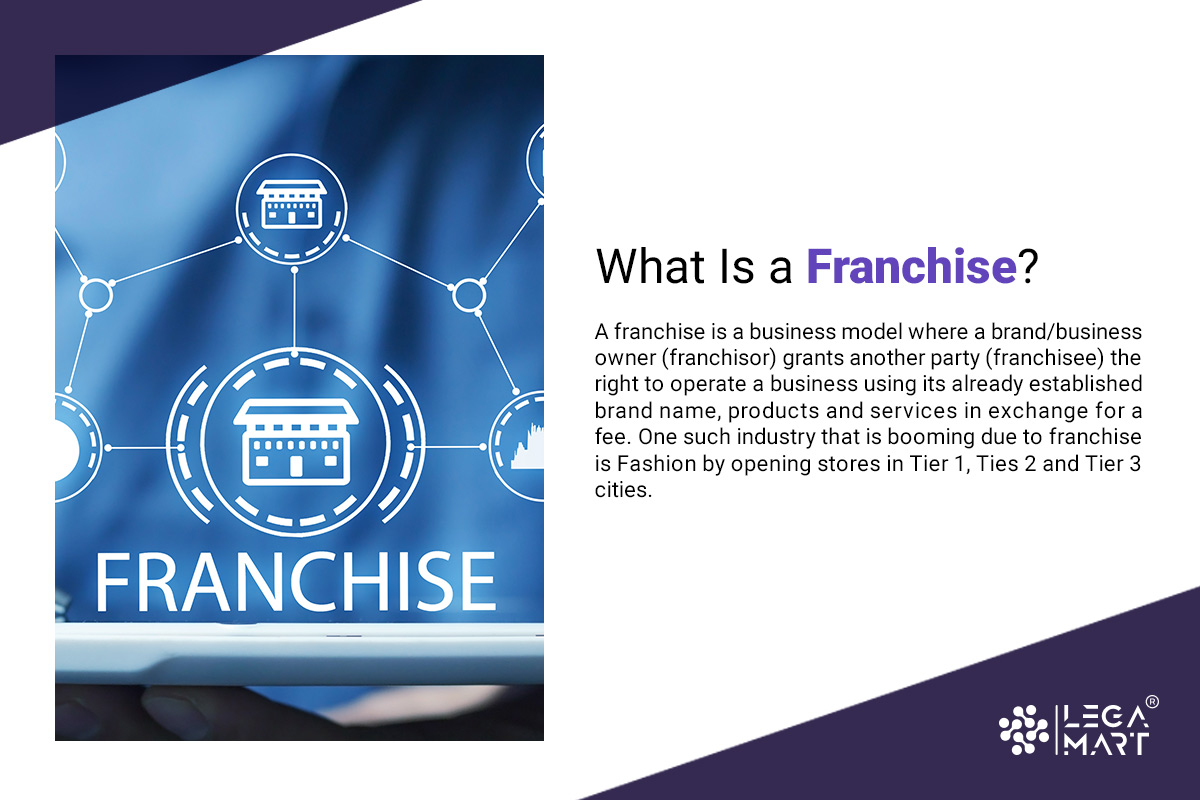
A franchise is a business model where a brand/business owner (franchisor) grants another party (franchisee) the right to operate a business using its already established brand name, products and services in exchange for a fee. One such industry that is booming due to franchise is Fashion by opening stores in Tier 1, Ties 2 and Tier 3 cities.
Franchise agreements are means of expanding one’s business in other locations. By concluding this agreement, the franchisee can operate a business or offer, sell, or distribute goods or services identified or associated with the franchisor’s trademark. The franchisee must also follow certain standards or qualities determined by the franchisor to avoid termination of franchise agreement.
Pros and Cons of Franchising
Franchising offers the advantage of tapping into a proven business model with a pre-established customer base, reducing the risks associated with starting a new business. However, this comes with the drawback of potential loss of control for franchisees, as major business decisions often require approval from the franchisor, leading to a more managed experience.
Pros
- Proven Business Model: Franchises come with a pre-established customer base, offering the benefits of a proven business model.
- Reduced Risk: Purchasing a franchise is often less risky than starting a business from scratch, minimizing the uncertainties associated with a new venture.
- Shared Relationship: Franchisees work with the franchisor in a shared relationship, allowing the franchisor to scale their business rapidly while franchisees benefit from business management support and skill development.
- Opportunities in Agreement: Despite the complexity of the franchise agreement, it provides a wide range of opportunities for the franchisee.
Cons
- Loss of Control: Franchisees may experience a loss of control as major business decisions are often made or approved by the franchisor, leading to potential feelings of being micromanaged.
- Cost and Complexity: Franchising is perceived as more expensive and complicated than licensing. Initial franchise fees and ongoing costs can be substantial but provide access to an entire business model.
- Legal Distinctions: Licensing agreements, while cheaper and less complicated, offer limited access to specific trademarks. Opting for licensing over franchising can pose legal risks, as they are not interchangeable, and misclassification may lead to legal consequences.
What are Some Legal Considerations when Entering Into a Franchise or License Agreement?
When entering into a franchise or license agreement, there are several legal considerations that both parties should keep in mind for clarity purposes to avoid any confusion whatsoever, including:
Franchise Disclosure Document: This document provides the prospective franchisee with information about the franchisor and the franchise opportunity. Some of the information in the FDD include; financial advances offered by the franchisor or its affiliates, list and contact information of current and former franchisees, and a description of the franchise system.
Understanding the Terms: whether a license or a franchise, parties need to understand the terms of the agreement. This includes each party’s rights and obligations, the agreement’s terms, and the fees and payments required.
Key intellectual property rights involved in a franchise or the license: parties should establish the key intellectual properties involved in the agreement they are entering into, whether a franchise license. Similarly, establish whether the IP rights are registered or protected and enforceable. Some essential IP rights involved are trademarks, patents, copyright and trade secrets.
Territory and Exclusivity: The agreement should clearly define the territory in which the franchisee or licensee is authorized to operate and any exclusivity provisions.
4 Key Differences of Franchise and License
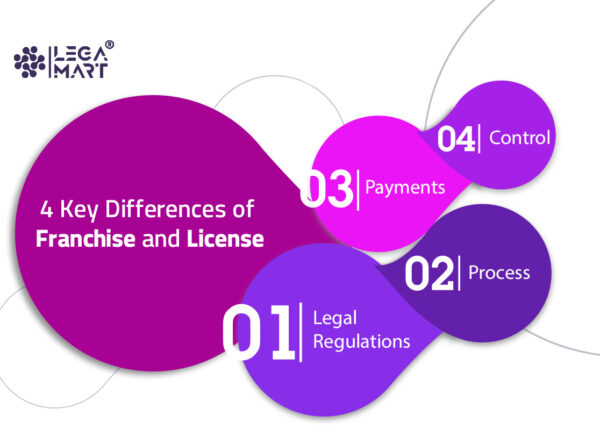
Control
By entering into a franchise agreement, you allow the franchisor to control your business. But there’s no such thing as licensing. The franchisor can exert much control over the franchisee’s business, such as its location, standards, and operation. This is because the franchisee’s business is an extension of the franchisors.
But it’s not the same in the licensing agreement. The licensor can only set limitations for using a trademark, technology, or formula. But it can not exert control over the licensee’s overall business. For example, it can not define the licensee’s general policy or decide how its business should be run.
Legal Regulations
Generally, there are more requirements in order to conclude a valid franchise agreement. For both of them, the general contract law is applicable. In the United States, there are specific federal regulations for franchises at the federal level and some additional requirements at the state level. You can learn more about the details of franchise agreements in the United States by looking at the franchise rules. Another overlooked yet important legal requirement that is important for the protection of businesses from financial loss is insurance, which must be taken into consideration.
Process
As mentioned above, the license agreement transfers the right to use, make and sell an idea, design, name, or logo. In contrast, a franchise agreement allows the franchisee to operate a business as an independent company branch.
So to perform a franchise agreement, the ongoing assistance of the franchisor is required to ensure that its branch is operating in compliance with its standards. While in a license agreement, the licensor has no other obligation than the one-time transfer of property or rights.
Payments
License agreements are cheaper than franchises. As mentioned in the previous article, several types of fees should be paid to the franchisor. These fees include the franchise fee, royalty fee, advertising fund and/or brand fund fees, and market introduction program costs. But we don’t face the same payments in licensing. If you’re a bit low on financial sources, licensing is your economical option.
Comparison of Franchising and Licensing
| Differences | Franchising | Licensing |
| Control | The franchisor can exert control over the franchisee’s business | Licensor has no control over licensee’s business |
| Legal Regulations | Franchise agreements are based on general contract law plus franchise regulation of each jurisdiction | Licensing agreements are only based on general contract law |
| Process | The ongoing assistance of the franchisor is required | The licensor’s obligation is only a one-time transfer of right |
| Payments | Includes several types of payments | Only one kind of payment |
Which One Should You Choose: Franchise or Licensing?
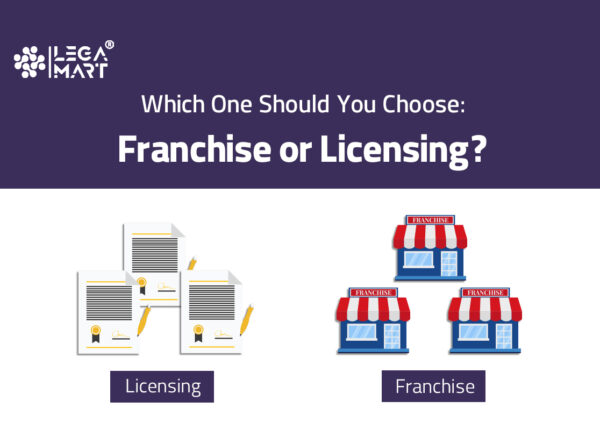
The answer to this question depends on your goals and needs; If you’re planning on expanding your business OR if you want to follow the success story of another well-known company, entering into a franchise agreement would be the right choice for you.
On the other hand, if you want your business to be completely independent and all you need to gain more profit is a logo or a formula, you probably need to conclude a license agreement.
Also, answering a few questions would be quite helpful in finding out which way to go:
- Do you want to keep your operation independent while using the reputation of another company?
- Are you looking for a quick and easy way to improve your business without regulatory requirements?
- Is there an idol business in your mind? Which method do you want to follow?
Still, entering into a legally binding relationship requires a detailed elaboration of your circumstances. So whether you want to conclude a franchise agreement or a license agreement, and generally any contract, never forget to consult a professional lawyer.
Let’s have a look at a case where parties could not establish whether the agreement was a license or franchise agreement, and the court was tasked with determining whether the relationship between the parties was that of a licensing or franchising arrangement;
Dr HK Fong Brainbuilder Pte Ltd v SG-Maths Sdn Bhd & Ors [2021] 1 CLJ 155
Dr. Fong Ho Keong (“Dr. Fong”) incorporated a company in Singapore known as Dr. HK Fong Brainbuilder Pte Ltd (“the Plaintiff”). Dr. Fong claims to have developed a proprietary teaching methodology called the “BrainBuilder Methodology.” On the other hand, Lim Sau Leong and Leong Chun Piew were interested in BrainBuilder Methodology and decided to set up SG-Maths Sdn Bhd (“the Defendant”), a Malaysian company that provides math education services and materials.
In 2013, the plaintiff entered into a License Agreement with the Defendant, granting the Defendant the right to operate the Plaintiff’s Intellectual Property in Malaysia using the BrainBuilder Methodology. In 2018, the plaintiff terminated the License Agreement with the Defendant, alleging that the Defendant had breached the terms of the license agreement by failing to pay royalties and operating a franchise system using the Plaintiff’s BrainBuilder Methodology without authorization.
Defendant denied these allegations and counter-claimed for breach of contract, claiming that the plaintiff had failed to provide adequate training and support. In addition, the defendants argued that they were not operating a franchise system but rather a licensing arrangement, as they had not used any of the plaintiff’s trademarks, nor had they been subject to the plaintiff’s control in their business operation.
The court found that the defendants had breached the terms of the license agreement by operating as a franchise system. Further, the court noted that while there was no formal franchise agreement between the parties, the practical realities of the arrangement indicated that the defendants were operating a franchise system. Therefore, the court’s final finding was based on the fact that the defendants had used the plaintiff’s intellectual property, such as its copyright in its teaching methodology, in the operation of their business and had required their franchisees to follow a specific set of guidelines and protocols.
It is always important for parties to explicitly define whether the contract is a franchise or a license agreement when entering into any agreement. In addition, both franchisors and franchisees or licensors and licensees must understand their rights and obligations under the agreement.
Conclusion
Franchises and licenses are two distinct business models that companies can use to expand their business operations. While franchises involve a broader range of business operations and are typically more regulated, licenses are more limited in scope and do not involve ongoing support or training from the licensor. However, as much as these differences are in place, most parties easily get confused while entering into these agreements. Therefore, various issues need to be explicitly set out in the agreement, including considerations on how to trademark aspects such as a logo, to minimize such confusion and any possible dispute in the long run.
Frequently Asked Questions
What is the fundamental difference between a franchise and a license?
The primary distinction lies in the level of control and support the franchisor provides to the franchisee. In a franchise, the franchisor grants the right to use its brand and business model, offers ongoing support, and imposes more significant operational controls. In a license agreement, the licensor provides the right to use its intellectual property but typically has minimal involvement in the licensee’s operations.
How do financial arrangements differ between franchise and license agreements?
Franchise agreements often involve more substantial financial commitments from the franchisee. This includes upfront fees, ongoing royalty payments, and contributions to the franchisor’s marketing fund. On the other hand, license agreements usually entail fewer financial obligations, with royalties being the primary ongoing cost.
Can you provide examples of well-known franchises and licenses?
McDonald’s and Subway are examples of well-known franchises where franchisees operate under a standardized model with extensive support from the franchisor. In contrast, licensing examples include merchandise bearing sports team logos or characters from entertainment franchises, where the licensee has the right to use the intellectual property in a specific way.
How does the level of operational control differ between franchises and licenses?
Franchises involve a higher degree of operational control exerted by the franchisor. Franchisees are expected to adhere to standardized processes, quality standards, and operational guidelines set by the franchisor. In licensing, the licensor typically has less involvement in day-to-day operations, allowing licensees more flexibility in their business operations.
Which is the better option for me – a franchise or a license?
The choice between a franchise and a license depends on your business goals, preferences, and the level of control you want. If you seek a comprehensive business model with ongoing support and are willing to adhere to strict operational guidelines, a franchise may be suitable. If you prefer more independence and flexibility in your business operations, a license may be a better fit. It’s essential to carefully evaluate your objectives and resources before deciding.
Are there legal differences between franchise and license agreements?
Yes, there are significant legal distinctions. Franchise agreements are subject to specific regulatory requirements in many jurisdictions, necessitating disclosure documents and compliance with franchise laws. Licensing agreements are subject to fewer regulatory requirements, providing more flexibility for the parties involved.

